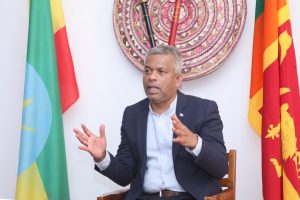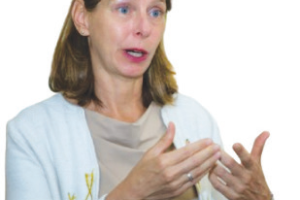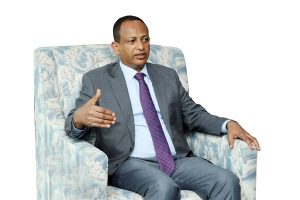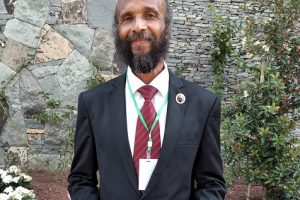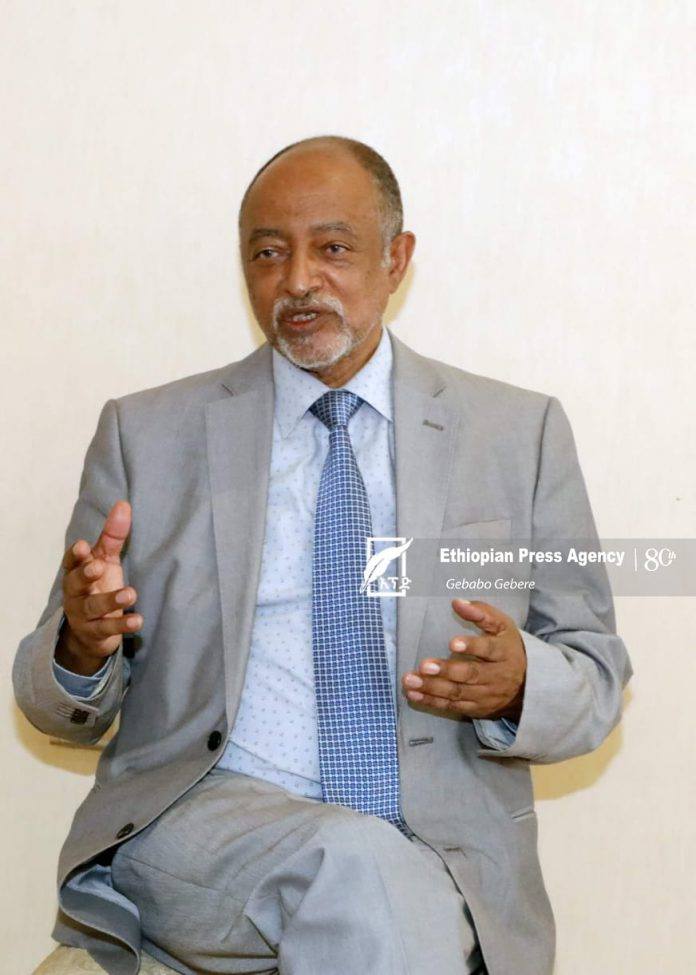
BY ADDISALEM MULAT
Today’s guest goes by the name of Prof. Achamyeleh Debela. He is one of the leading contemporary Ethiopian-born artists. He was born and raised in Addis Ababa and graduated from the Addis Ababa Fine Arts School where he studied under Ale Feleghe Selam, Gebere Kirstos Desta, Skunder Boghossian, and BHansen Bahia.
As learnt from the Professor’s biography, he earned additional degrees at Ahmadu Bello University in Zaria, Nigeria (BFA); Morgan State University (MA); and the Maryland Institute College of Art. The professor pursued his doctoral studies in Art Education and Computer Graphics at Ohio State University. At the moment, he is a professor of art at North Carolina Central University in Durham.
Over and above that he is recognized internationally for his pioneering digital compositions which he creates by manipulating images scanned from his own drawings, paintings, and photographs as well as objects and designs from a variety of appropriated sources.
On top of that Prof. Achamyeleh’s works have been featured in numerous solo and group exhibitions. Notably, his work was included in the important exhibition Seven Stories about Modern Art in Africa shown at Whitechapel Art Gallery, London; Malmo Konsthall in Sweden; and the Guggenheim (Soho) in 1995/96. He was one of ten artists included in Ethiopia passages: Contemporary Art from the Diaspora at the National Museum of African Art in 2003.
Locally he had a solo exhibition at the Reitz Union Gallery organized by UF doctoral student Nicholas Frech in conjunction with the ACASA Triennial in 2007. His work is included in virtually every publication on modern and contemporary African Art.
Prof. Achamyeleh is also a prolific writer and has published numerous essays and book chapters on Ethiopian modern and contemporary art. His work is represented in the Ethiopian National Museum in Addis Ababa, the North Caroline Museum of Art in Raleigh, the James Lewis Museum at Morgan State Museum in Baltimore MD and the Art Museum at NCCU, and the Samuel P. Harns Museum of Art at the University of Florida, Gainesville, Florida.
The Ethiopian Press Agency had a short stay with Prof. Achamyeleh on the topic of a wide spectrum of issues revolving around chapter and verse of Ethiopian art and the present situation of Ethiopia.
What is your opinion on Ethiopian art industry?
During the regime of Haile Selassie, going abroad for further education was as easy as falling off a log. There were a lot of opportunities in the left, right, and center of the country.
Moreover, the regime was entirely willing to give the green light for anything that can take the status of Ethiopian art to the next level of accomplishment. On several occasions, the emperor was willing to stand by the side of artists with all his heart without batting an eye.
In addition to this, artist Ale Feleghe Selam got the opportunity to study art in the United States of America intending to take the status of the country’s art to new heights. Other than that Maitre ArtistAfewerk Tekle was sent abroad for the same purpose.
Speaking of which, the instant artist Ale Feleghe Selam returned home in 1949, he managed to get himself involved in a broad range of undertakings that could take the art industry to new perspectives at its earliest convenience. A case in point, he was schooling high school students at no charge on the weekends.
In a similar vein, the artist managed to organize an art exhibition and invited various people such as diplomats, the emperor, and whatnot. In this fashion, he collected 75,000 Birr and requested the emperor to smooth the progress of opening an art school. In the course of time, he ended up transforming vision into reality.
Is Ethiopia’s art industry promoting the country’s natural resources and heritages?
Needless to say, the country is inundated with a considerable degree of resources that describe in black and white the real picture of the country and win the hearts and minds of everyone almost immediately. While on the subject, the other unique feature of Ethiopia is the fact that the country is the cradle of mankind.
On a separate note, whenever I inculcate my students I attempt to familiarize the aforementioned reality on the ground with them as quickly as possible. Apart from this, on numerous occasions, I elucidate the contribution Ethiopia has made to the growth of the world despite we lagged behind others.
What do you think is many Ethiopians try to go abroad while Ethiopia has immense potential and opportunities to develop itself?
In spite of the fact that we possess a substantial amount of natural resources, we have not made an effort to transform them into valuable assets that can transform the lives of the population as a whole almost instantaneous.
They are not utilized as they should be. In the present climate, most of the things that we possess do not mirror our real identity. They make us feel embarrassed.
It is to be regrettable that our people are departing this life on the grounds of ethnic politics every once in a while. We are losing our personality and togetherness once in a great while. To the best of my knowledge, I would venture to say, during the regime of the TPLF junta officials, we were not able to attach importance to human personality.
Against this background, we should be able to attach importance to building a good personality that binds the general public together.
What is your take on Ethiopia’s current political situation?
As Ethiopia is encircled by its enemies, the country now and then should be able to follow up every step very closely. It is abundantly clear that Ethiopia’s adversaries do not want to see the growth of the country once in a great while.
No matter what happened, they cannot materialize their dreams. All their dreams will go for nothing. Above and beyond, no matter how hard they tried, they cannot turn their vision into a reality.
Was there division amid Ethiopian Diasporas residing in various?
parts of the world? If yes, what were the main lines of divisions?
With the understanding that we are products of our environment, our experience matters. As most of us cannot fail to recall the culture that we grew up in, we have taken quite a lot of good things with ourselves. What we know is only Ethiopianism. Some of us went there without anything.
Sadly, most of the causes of conflicts that arise amid the people of Ethiopia are on account of educated people. Even though some of them possess a wide spectrum of degrees in various fields of study, they are not that mature enough. To the surprise of everyone, as they are turning out to be only one way sensitive, they are getting off track again and again.
I am under the impression that as there is a broad range of things that bind us together, Ethiopians should be able to get back to the right track and take the matter seriously.
In a similar vein, fabricated stories aiming at throwing cold water on the unity of Ethiopia is growing out to be a threat to the country now and then. Speaking of which, the case of Mai Kadra massacre could be mentioned as an example. Sad as it may sound, day laborers have been exterminated.
To tell the truth, the envisioned target is not to make the people of Tigray and Amhara lead a peaceful life but kill one another. It is no hyperbole to say, they did a shameful thing.
Likewise, the people of Guji and Gedio have lived in peace and harmony time immoral. I would go so far as to say, they are two sides of the same coin. However due to evildoers, a considerable amount of property damage was witnessed, several people were killed, and displaced. We are bound by a lot of things.
If we keep on missing the looked-for goal, we cannot harvest the fruit of accomplishment. Above and beyond, the situation of the country will have a go at moving into uncharted territory time and time again.
Similarly, we should all work like two peas in a pod to return the former glory of God. If we fail to do so, we may end up exposing Ethiopia to danger beyond a shadow of a doubt.
What sorts of activities are undertaking to support communities affected in Mai Kadra, Shashemene, and Tigray State? Who are the sources of your income?
Our sources are Ethiopian Diasporas. We collect money from Ethiopian Diasporas residing in various parts of the world. As far as I am concerned, Wherever Ethiopians live there rights should be respected. Targeting at getting to the bottom of the problem, we have been carrying out a considerable degree of undertakings working in close collusion with Ethiopian Diasporas.
At the time when conflict took place in Metekel, Benishangul, and Gondar, Ethiopian Diasporas were the first to stand by the side of them in a short space of time. In a similar vein, at the time when Ethiopians were beheaded and killed by ISIS, we have come to comfort the victims’ families in the shortest possible time.
Following the problem that took place in Guji and Gedio, we managed to donate nearly 38 million Birr with the purpose of rehabilitating and making them stand on their feet. Though the situation was heartrending, efforts are being made to straighten out predicaments.
The fund is collected by human rights activist Tamagne Beyene and the board members’ effort. Furthermore, we work in collaboration with international organizations. By way of illustration, we work with International Organizations for Migration (IOM) and World Vision.
What are your plans for the future?
To take the country to new heights of accomplishment, we should be able to stay focused at work. While on the subject, it is very important to raise the following questions: What are the causes of displacement? What wrong have they done? Why is it impossible to avoid the problem?
Notwithstanding the fact that there are complicated problems that need special attention, the government should give due attention more than ever before with the intention of straightening out the problem within a short space of time. We cannot do it on our own. For the sake of truth, whenever Ethiopians face a problem we have the responsibility of fighting for their rights in the shortest possible time.
The incident that took place after Prime Minister Abiy Ahmed returned home from Metekel is a heartbreaking scenario. The major actors behind the scenes should be identified almost immediately. In actual fact, as there is a deep-rooted problem, the source should be identified.
We expect that the government knows the reality on the ground more than we do. Whenever Ethiopia grows, the country encounters quite a lot of challenges.
To the surprise of everyone, when we requested the people of Gedio regarding the main cause of the conflict, they do not have a wee drop of an idea. They are bounded by marriage, have lived together, celebrated holidays, helped one another, and other related aspects.
The Ethiopian Herald January 26/2021

